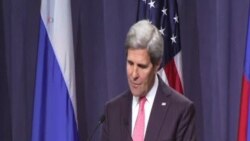WASHINGTON —
President Barack Obama says the U.S.-Russian agreement to strip Syria of chemical weapons has put the world in "a better position" to avoid further chemical attacks. The president, in a television interview aired Sunday, says the situation in Syria is "untenable" as long as President Bashar al-Assad holds power.
President Obama said he welcomes Russian President Vladimir Putin's involvement in diplomatic efforts to solve the Syria crisis.
Obama appeared on the ABC TV program This Week With George Stephanopoulos. He said the U.S. and Russia should continue working together on Syria, even though Mr. Putin sees the issue differently.
"I do not think that Mr. Putin has the same values that we do, and I think, obviously, by protecting Mr. Assad, he has a different attitude about the Assad regime," he said.
The president said that as long as Mr. Assad is in power in Syria, "there is going to be some sort of conflict there."
He credited the threat of U.S. airstrikes with pushing Russian and Syrian officials toward a deal.
"As a consequence of the pressure that we have applied over the last couple of weeks, we have Syria, for the first time, acknowledging that it has chemical weapons, agreeing to join the convention that prohibits the use of chemical weapons, and the Russians, their primary sponsor, saying that they will push Syria to get all of their chemical weapons out. The distance that we have traveled over these couple of weeks is remarkable," he said.
U.S. lawmakers have varied reactions to the agreement. Republican Senator John McCain called it "an act of provocative weakness." Other Republicans and Democrats want a deal to avert U.S. military action.
U.S. Secretary of State John Kerry, who negotiated the agreement with the Russians, called it "the most far-reaching chemical weapons effort...that has been designed." He said, however, that to implement the accord, the threat of force must remain.
"The threat of force is real, and the Assad regime and all those taking part need to understand that President Obama and the United States are committed to achieve this goal. We cannot have hollow words in the conduct of international affairs," he said.
Kerry spoke in Jerusalem, after meeting with Israeli Prime Minister Benjamin Netanyahu. The Israeli leader said the Syrian regime must be stripped of all its chemical weapons.
"The world needs to ensure that radical regimes do not have weapons of mass destruction, because, as we have learned once again in Syria, if rogue regimes have weapons of mass destruction, they will use them," he said.
Kerry next goes to Paris, to meet on Monday with the foreign ministers of France, the United Kingdom, Turkey and Saudi Arabia.
President Obama said he welcomes Russian President Vladimir Putin's involvement in diplomatic efforts to solve the Syria crisis.
Obama appeared on the ABC TV program This Week With George Stephanopoulos. He said the U.S. and Russia should continue working together on Syria, even though Mr. Putin sees the issue differently.
"I do not think that Mr. Putin has the same values that we do, and I think, obviously, by protecting Mr. Assad, he has a different attitude about the Assad regime," he said.
The president said that as long as Mr. Assad is in power in Syria, "there is going to be some sort of conflict there."
He credited the threat of U.S. airstrikes with pushing Russian and Syrian officials toward a deal.
"As a consequence of the pressure that we have applied over the last couple of weeks, we have Syria, for the first time, acknowledging that it has chemical weapons, agreeing to join the convention that prohibits the use of chemical weapons, and the Russians, their primary sponsor, saying that they will push Syria to get all of their chemical weapons out. The distance that we have traveled over these couple of weeks is remarkable," he said.
U.S. lawmakers have varied reactions to the agreement. Republican Senator John McCain called it "an act of provocative weakness." Other Republicans and Democrats want a deal to avert U.S. military action.
U.S. Secretary of State John Kerry, who negotiated the agreement with the Russians, called it "the most far-reaching chemical weapons effort...that has been designed." He said, however, that to implement the accord, the threat of force must remain.
"The threat of force is real, and the Assad regime and all those taking part need to understand that President Obama and the United States are committed to achieve this goal. We cannot have hollow words in the conduct of international affairs," he said.
Kerry spoke in Jerusalem, after meeting with Israeli Prime Minister Benjamin Netanyahu. The Israeli leader said the Syrian regime must be stripped of all its chemical weapons.
"The world needs to ensure that radical regimes do not have weapons of mass destruction, because, as we have learned once again in Syria, if rogue regimes have weapons of mass destruction, they will use them," he said.
Kerry next goes to Paris, to meet on Monday with the foreign ministers of France, the United Kingdom, Turkey and Saudi Arabia.





